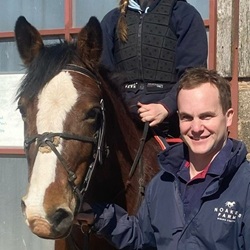
Ed Barrett (36) rode as a point to point jockey for several years and had around 315 rides with 37 winners and one winner in France from 10 rides under rules. He was working as an assistant trainer for Henry Daly before a fall in 2015 at a Devon point to point left him paralysed from the neck down. He subsequently went through a gruelling ten month period of rehabilitation both in hospital and at Oaksey House before returning to his family home in Herefordshire. With the support of JETS he has gained qualifications to become a riding instructor, most recently gaining a Stage 4 Senior Management certificate which has helped him with the family riding school business (Noakes Farm Riding Centre) where he’s currently working.
Your riding career was obviously cut short but did you know what you wanted to do as a second career after being a jockey?
I actually trained as a riding instructor before my racing career got underway as my mother had insisted that I should have something to fall back on if something went wrong which proved to be very accurate. So I got my Assistant Instructor qualification and knew that it would be useful if I decided I wanted to contribute to the family business which seemed the obvious thing to do after my injury.
What further qualifications have you needed to continue to develop your career?
There is a lot of red tape and administrative work involved in a riding school business and the more qualifications you have the better it is from an insurance perspective so initially, after I approached JETS, I liaised with the BHS education department who advised I complete a Level 5 Diploma in coaching riders for competitions. I passed that and then when COVID happened I looked at options for online business qualifications again using JETS to help financially as the training was quite expensive.
What have been the hardest aspects of the training?
The teaching comes naturally to me but a lot of the business administration around VAT and insurance is fairly complicated so I had to study really hard. The course was made up of eight one hour sessions which I then had to go back over and take notes before doing a four hour exam in which we were presented with business case studies and had to show how we would improve them.
How has the Management qualification helped your career?
I’m a lot more confident now, understanding how businesses are run and what skills you need. It’s helped with so much of the administrative management side of the business and we are now a 5 star BHS rated riding centre which I’m really proud of.
What support have you received from JETS and the IJF with regards your second career?
Lisa at JETS has been really good at helping me find the right people to carry out the training I needed. JETS also helped me do some media training with Ed Chamberlin which I really enjoyed and has certainly improved my communication. The IJF assisted me by providing me with an all terrain mobility scooter to allow me access across the fields to the outdoor arena. My family also made adjustments around the farm to make it more accessible, such as an enclosed raised teaching platform and a teaching hut. I struggled with my voice in the early stages after my accident and use a portable speaker to assist with my voice. I’ve found you have to find ways to adapt and overcome to make it work for you.
What is the most satisfying aspect of your role?
We mainly work with children and I’ve enjoyed seeing the progression and when you see a young person really improving that’s rewarding. I feel I’ve definitely become better at managing people and improving my communication skills. I enjoy putting together various exercises and get really positive feedback on my coaching which is nice especially when I’ve had to deal with such a traumatic injury.
What plans do you have for the future?
I’m about to go and do two weeks rehab stay at Oaksey House working on issues with my shoulder I’ve picked up playing wheelchair tennis. It will give me some time to reflect on where I’m going with my career. The next step with my coaching is to gain my Intermediate Instructor qualification but I’ve got other areas I’m interested in and would like to develop more skills to broaden out the work I can do alongside the instructing.

